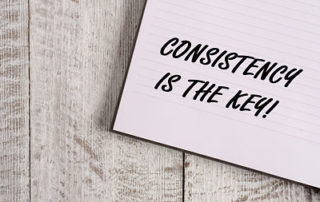Consistency triumphs over bursts of brilliance
Last week, one of my mornings was consumed with podcast recordings and interviews. In some cases, I was the subject matter expert but in most, I was the host, asking questions of other agency- centric subject matter experts. By sheer coincidence every conversation danced around some aspect of business development, retaining clients and creating a culture that had the capacity and passion for chasing opportunities. Interestingly, there was a thread that wove through all of these separate conversations. The theme was consistency and the overarching opinion was that agencies live and die by their habits and by the agency owner’s habits. What we do (or don’t do) on a consistent basis sets our course. That got my wheels spinning and I came up with a little quiz for you to take. Do you have at least 4-5 hours a week blocked off on your calendar for new business sales (not marketing) activity? Do you hold (and not cancel) a weekly new business meeting with your internal team? Do you have a list of no more than 25 “I’d love to have them on our roster” prospects that you proactively touch at least every 6 weeks? Have you defined your agency’s philosophy/point of view so you can differentiate yourself and does every agency employee know, understand and use the same language to describe it? Now, a tangential question. How many new clients that are individually worth at least 15% of your agency’s current AGI have you earned since January? My guess is that there’s a correlation between how you answered the quiz questions and your answer to my tangential question. You and your agency are a product of what you consistently do. Are you reaping the [...]











